Mateusz Kapera (RadioZet.pl),
Maria Pankowska (OKO.press),
Dominik Szczepański (Newsweek Polska),
Karolina Wysota (money.pl),
Michał Żyłowski (Gazeta Wyborcza)
Coordination and editing: Wojciech Cieśla (FRONTSTORY.PL/VSquare.org)
OSINT research and data analysis:
Alicja Pawłowska, Radosław Łukasik
Illustrations: Mariusz Kula 2025-02-20
Mateusz Kapera (RadioZet.pl),
Maria Pankowska (OKO.press),
Dominik Szczepański (Newsweek Polska),
Karolina Wysota (money.pl),
Michał Żyłowski (Gazeta Wyborcza)
Coordination and editing: Wojciech Cieśla (FRONTSTORY.PL/VSquare.org)
OSINT research and data analysis:
Alicja Pawłowska, Radosław Łukasik
Illustrations: Mariusz Kula 2025-02-20
- In Poland, you wait for your mephedrone delivery like you would for a pizza – it comes in less time than it takes for the police to arrive. Without leaving the house, anyone can buy almost any drug. Channels on the Russian Telegram app advertise the services of hundreds of dealers across the country.
- Two popular Polish platforms are also used for online drug dealing: parcel lockers and BLIK payments. Last year alone, parcel locker provider InPost discovered half a ton of drugs in shipments.
- Both platforms are aware of the problem. Although they cooperate with the police, their control over who sends what through them is limited.
- We have investigated the scale of the phenomenon: it is huge. We found hundreds of thousands of advertisements for the sale of drugs.
- The online trade epidemic is claiming lives, but the police catch dealers randomly or not at all. Some police stations do not see the problem. The authorities have no plan on how to deal with the situation.
“Hey, I’d like to get some mati,” our conversation with a drug dealer on the Telegram app begins. The reply comes a few seconds later: “Hey, how much do you need?”
“Mati” is a Polish slang term for mephedrone, a highly addictive drug. As part of a journalistic experiment, we tried to order it via Telegram. Everything happens faster in the app than in online shops. But just like in a shop, the dealer asks for a parcel locker number and an email address. Payment can be made via BLIK, a mobile payment system in Poland.
Telegram, a Russian social media app, is regularly used by over half a billion people. It is among the top ten social media platforms in the world, and is mainly used by young people (almost 30% of users are between 25 and 34 years old). In Poland, it is used by 2.8 million people.
By using Telegram as a huge, anonymous marketplace, criminals have unprecedented access to customers. And customers to suppliers. Doctor’s note for sick leave? Click. Driver’s license? Click. Russian sabotage? Click. Drugs? That’s what this story is about.
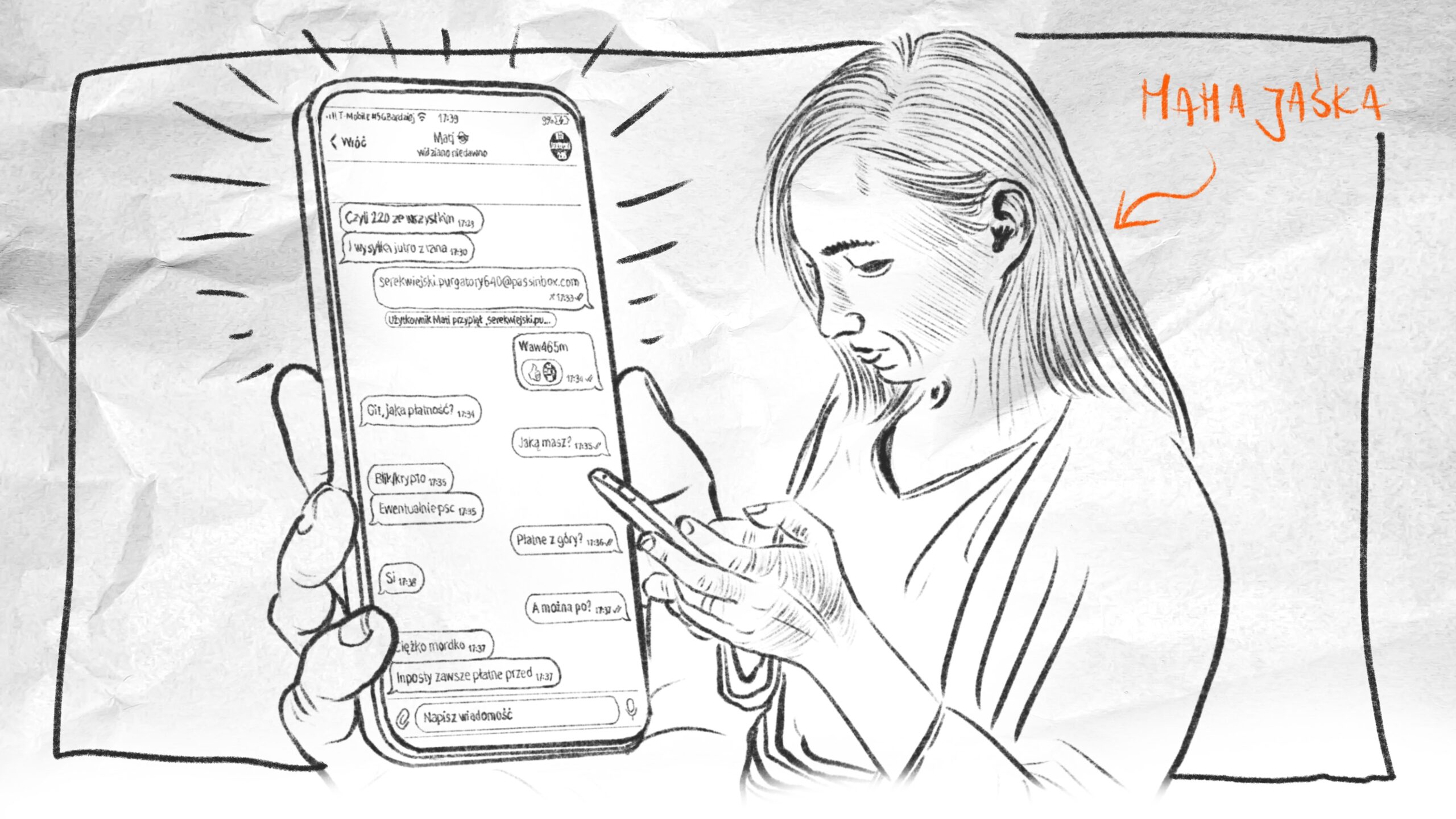
Anna, Jasiek’s mom:
It all started with Telegram. That’s where Jasiek bought oxycodone. He overdosed. In the hospital, I started going through his phone, there were thematic groups named after specific drugs, “Oxycodone” or something else. He bought there at first, after a while, already addicted, he started selling.…Today he is seventeen years old and addicted.
Select City and Delivery Method
As part of a joint investigation involving reporters from Newsweek, Radio Zet, Gazeta Wyborcza and OKO.press, coordinated by FRONTSTORY.PL, we analyzed 300 messages from popular Telegram groups. Using these messages, we then trained a language model, a special computer algorithm that automatically recognizes messages about drug sales and extracts important information from them: types of substances, delivery methods, payments. With help from the model, after beginning with a manual search, we were able to analyze 500,000 messages that came from groups offering drugs.
This gave us reliable statistics. What did we find out? That the amount of drugs that can be bought in Poland via Telegram varies from a few grams to a few kilograms (several pounds) to buying in bulk. Through the app’s bots, as in an online shop, you can choose a city, type of drug, delivery method and payment method. The advertisements encourage the purchase of psychoactive substances. Benzodiazepines, opioids and opiates, and diet pills are also popular. The most popular drugs are mephedrone, cannabis and amphetamine.
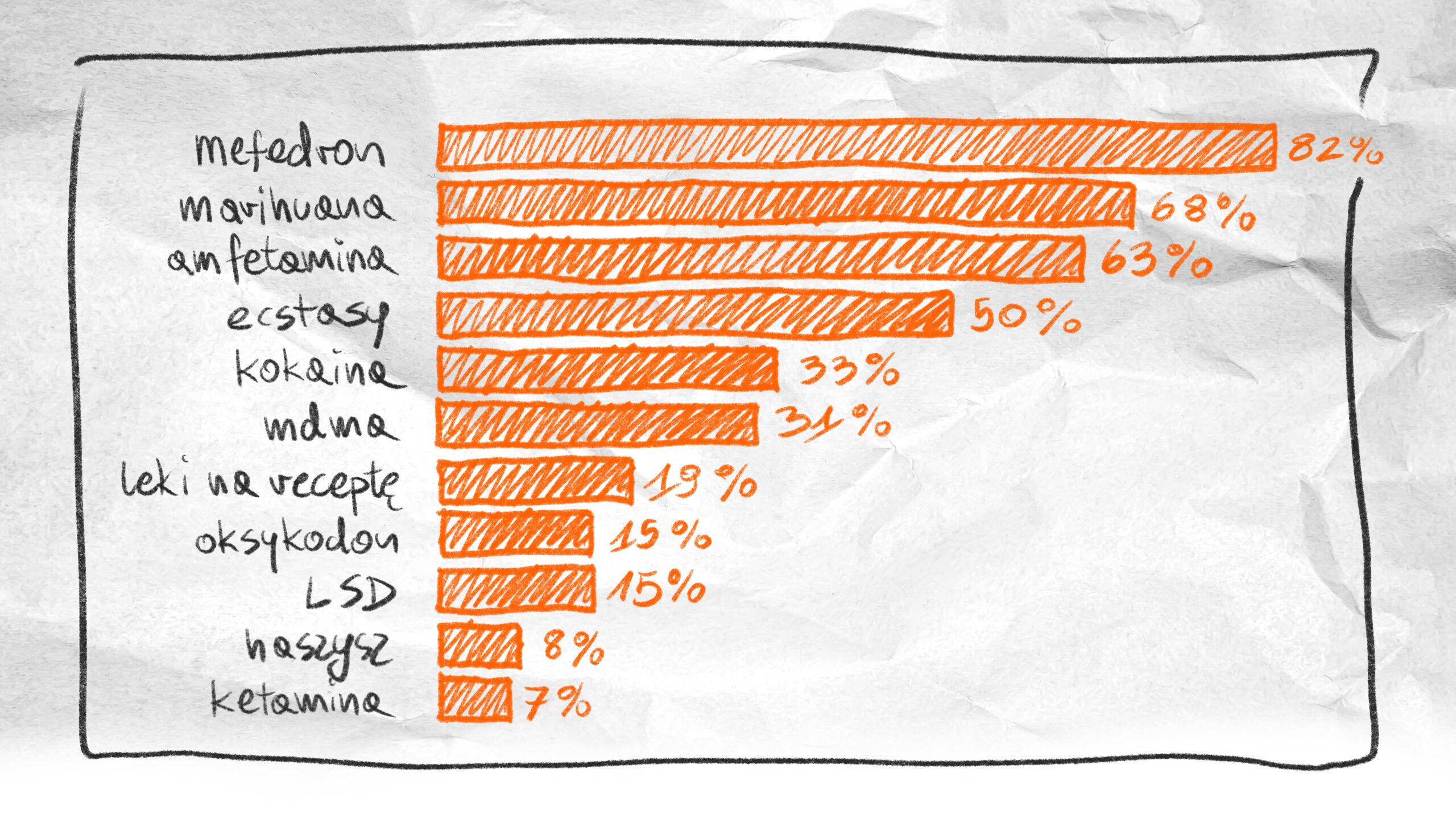
The most popular drugs on Telegram
From the data we collected, we can conclude that the most popular delivery methods are undoubtedly InPost parcel lockers and taxis (as many as 26% of messages contained the keyword “InPost” ). According to the police and the prosecutor’s office, customers mainly pay with BLIK – but we found the keyword “BLIK” in only 5.5% of messages. Other payments accepted by dealers include bank transfers, ATM payments and cryptocurrency transfers.
The same advertisements are repeated thousands of times in different groups. FRONTSTORY.PL analysts managed to identify 9,000 unique offers and 1,075 unique suppliers. It is impossible to determine whether all those involved in these messages are actually trading or just acting as intermediaries. From the Telegram discussions that we are monitoring, we know that fraud is common (e.g. dealers accepting money but not delivering the goods).
Nevertheless, it’s clear that a trade that once took place on the street has found its way into the digital world. Customers check dealers through “LC” (Legit Check) channels to try to avoid fraud and to verify dealers and products. They report dishonest dealers and exchange tips on how to recognize them.
Researchers from Intel471, a well-known cybersecurity company, claim that Telegram is a trading hub for low-level criminals. Anyone can set up a channel. All you need is a smartphone, and no one monitors the content. Some dealer channels disappear quickly, and fraud is commonplace.
Contrary to popular belief, it is difficult, but not impossible, to find out who is behind the user names on Telegram – including dealers and customers.
Examples of drug advertisements on Telegram
- “MDMA, one of the main ingredients of our popular Punishers (1g – 130PLN). Don’t look any further, you won’t find better!.”
- “Weed, edibles, vapes, oils, hash, coke, ket, speed, mdma, meth, dmt, heroin.”
- “Open the door to an extraordinary world of psychedelic experiences and creative inspiration.”
Some of the criminal Telegram channels have corresponding accounts on Facebook or Instagram, for example. On both of these platforms, drugs are traded in private chats — but we know that dealers advertise Telegram channels on these platforms, among others, to redirect potential customers back to Telegram.
For young users, buying drugs online is more convenient, faster and safer than going to dark alleys. It is difficult to measure the scale, but available data shows that it is becoming increasingly popular. Meta admitted that in 2023 alone, it removed 9.3 million drug-related posts from Facebook and 10 million from Instagram.
According to research from that year, drug advertisements made up as much as 13 percent of all posts across social media platforms.
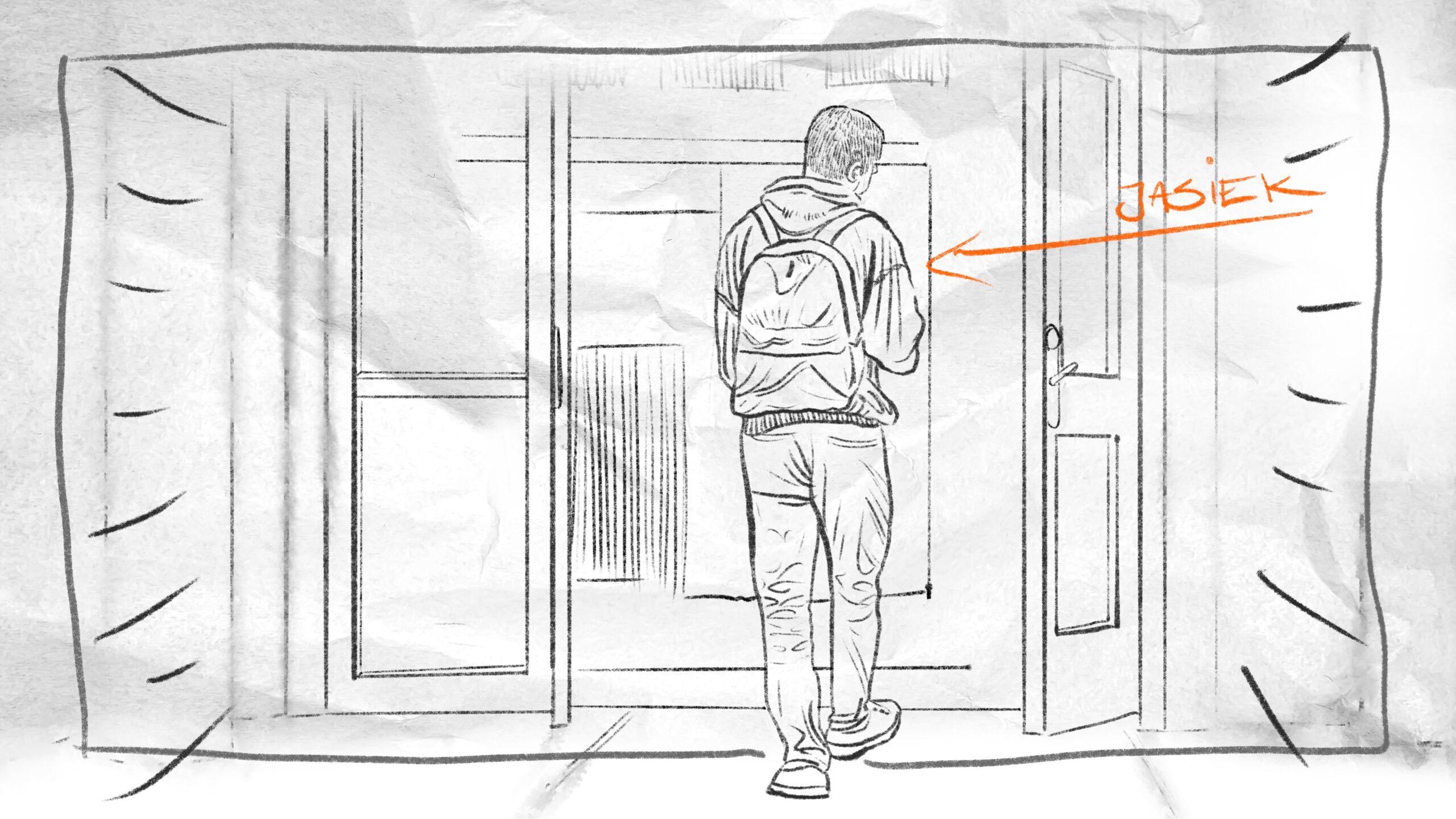
Anna, Jasiek’s mom:
Where did he find out? From his environment, school, friends. You just find out from one another. You ask how does it happen? It’s the environment plus Telegram.
Dealer in a Hybrid World
It is difficult to get a full picture of the online drug market, and there is still a lack of comprehensive, international research on the subject. The Polish experts we spoke to point out that almost every country has a different culture when it comes to using the internet to deal drugs. In Sweden and Iceland, the popular channel is Meta’s Messenger. In Ukraine, it is Telegram.
Professor Piotr Siuda, sociologist and professor at the Kazimierz Wielki University in Bydgoszcz, is researching how drugs are traded in Poland and who the average user is. His team is contacting Telegram account holders, users and dealers.
“Drugs come in many forms, but we came across respondents who were looking for something more than just marijuana, which is still easy to buy on the street,” said Siuda. “For example, MDMA, mephedrone, cocaine. They all said they avoided fentanyl” (a deadly synthetic opiate popular in the USA).
Although the study (funded by the National Science Centre) is still far from completion, it is already clear that, though Telegram has been around in Poland for a long time, it took off during the pandemic. In a 2023 report entitled “Addiction in Poland,” the National Centre for the Prevention of Addictions (KCPU), supervised by the Minister of Health, also points to the pandemic as the moment when online drug trafficking began to flourish.
The report confirms the findings of Siuda’s team: “The nationwide lockdown forced dealers to change their distribution modus operandi and move to online marketplaces. These marketplaces have rapidly expanded the catalogue of available substances, ensuring a high level of professionalism of the services offered and exemplary customer contact,” the report, dry as a corporate memo, reads. “Now that the pandemic restrictions are no longer in place, initial observations suggest a strengthening of this sales method on the Polish market.”
The KCPU has also been conducting its own research into online drug dealing since 2023. The project, led by Adam Stasiak, will be carried out until December. “In Poland, we still know relatively little about people who deal drugs online. We conduct so-called in-depth interviews to get a better understanding of the structure of the phenomenon,” Stasiak told us.
The Chief Sanitary Inspectorate publishes data on poisoning by designer drugs every year. The reports look reassuring: in 2023, there were only 264 such poisonings. What about other types of drugs? We asked the National Health Fund for this data. It turns out that since 2018, poisonings and mental or behavioral disorders caused by drugs other than designer drugs have increased by 41%, reaching almost 90,000 last year.
Also since 2018, the number of people being treated for drug addiction has increased by 32%. Last year, there were over 52,000 people treated for drug addiction in Poland.
From time to time, the Supreme Audit Office (NIK) is called in to carry out inspections related to drugs or drug addiction. In at least two inspections after 2013, the NIK raised the issue of drug trafficking via the internet. There was no reaction from the authorities.
Thousands of Groups, Hundreds of Dealers
Telegram offers various levels of privacy. Using the highest level, the user creates a “secret chat.” The activity in such chats is completely private and even Telegram itself — according to the platform — cannot see its content. From a technical point of view, Telegram could read other messages, which are not encrypted, and pass it on to the police — but in its regulations, the company has stated for years that it does not do this.
The police in Belgium and France have long complained about the “almost total lack of response from Telegram to legal requests.”
It was not until French police arrested billionaire Pavel Durov, Telegram’s CEO and founder, last August that the debate on moderation in the app was revived. Durov has been accused of aiding and abetting illegal transactions, drug trafficking, fraud and the distribution of child sexual abuse material.
Telegram defended itself by claiming that the moderation of the platform is “in line with industry standards” and that it responds to some police requests for removal. But French prosecutors have accused Durov of not doing enough to moderate child sexual abuse material.
In June, Durov declared that he only employed “around 30 engineers” to operate the platform. In September, after his release from custody, he admitted that Telegram’s rapid growth to 950 million users had caused “growing pains” that allowed “bad actors” to exploit the platform.
He was eventually charged with aiding and abetting organised crime. He was released in August after paying a €5 million bail. He is not allowed to leave France and has to report to the police twice a week.
In October, the platform updated its user agreement to share the IP addresses and phone numbers of rule breakers with the authorities. “We have clarified that the IP addresses and phone numbers of rule breakers may be disclosed to the relevant authorities,” Durov announced on his Telegram channel.
“None of the respondents had heard or didn’t really care that Telegram changed its policy after Durow’s arrest and data about such accounts or groups could theoretically be passed on to the authorities,” said. Siuda, the professor. “The topic either didn’t come up, even though we asked about it, or was ignored.”
We asked Telegram’s press office how many requests for data disclosure it had received from Polish services. We did not receive a response. The Internal Security Agency and the Central Anti-Corruption Bureau refused to provide us with such information.
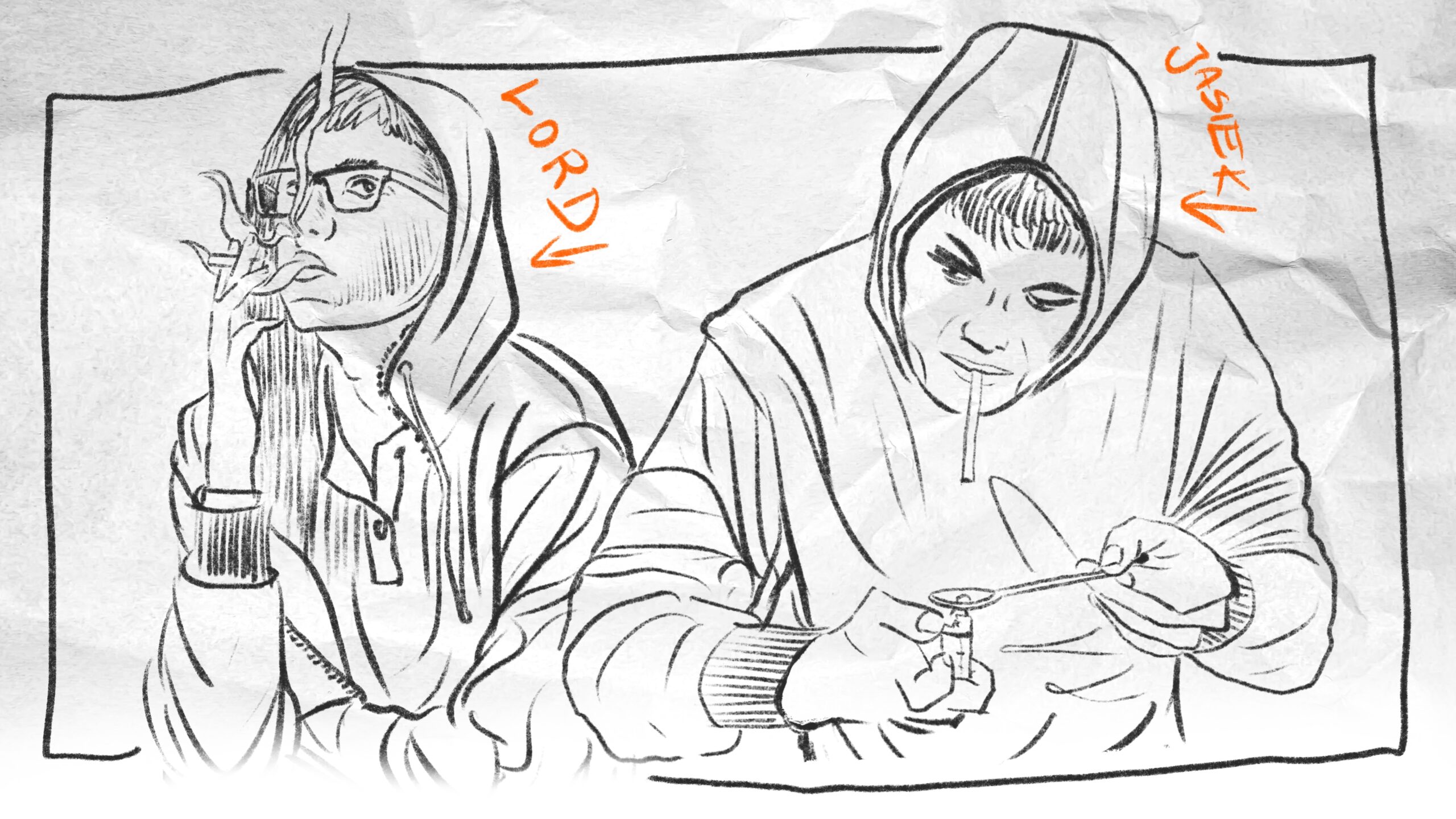
Anna, Jasiek’s mom:
There are also couriers. They bury these packages with the ordered drugs. It must be cheap enough that they accept the risk that someone else will find it. They hide it behind gutters, in rubbish bins. They take a photo of the hiding place and when the customer pays, they send him a photo and the address, I don’t know, 58 Zwycięzców, second gate, third gutter on the left.
Dead drop in a Gutter on Zwycięzców Street
In July 2024, we spoke to Serhij (name changed), a young Ukrainian from Kharkiv who had been living in Warsaw for three years. He worked in the catering industry and bought drugs via Telegram at least once a week after hours. According to him, it is the fastest and most anonymous way to get hold of the goods. Serhij believes that there are 50 Telegram shops in the city, and more than 200 active dealers on the app.
“You choose what you want and how much you want, and you transfer the money,” said Serhij. “It’s a transfer to a bank card registered to a homeless person, a fake account or cryptocurrency. The dealer sends you a photo of the location and the geographical coordinates. It’s a dead drop, where the package will be waiting. Either you dig it up or it’s attached to something with a magnet. The location is not noticeable to the uninitiated. It can also be delivered by Uber, it all depends on the shop.”
Shops advertise themselves in the city with tags. They can be found on walls. Look carefully and you may spot graffiti with a characteristic @ sign, bearing a word or several and a number. The number is the shop’s index on Telegram.
Serhij told us that each shop has its own way of operating. Sometimes an electronic bot is responsible for contact, other times several groups report to one dealer. Drug names are labelled with codes.
The network is full of easy to find advice on how to trade without getting caught. The market is flooded with virtual, deactivated or foreign SIM cards. It is also easy to find instructions on how to testify in case of arrest to avoid liability.
Serhij confirmed that the online drug market in Ukraine works in a similar way. The only difference is that Telegram has only been actively used for drug dealing in Poland for a few years.
“For me, Telegram is a tool like Uber or Glovo,” said Serhij. “I order, I pay, I pick up. I’ve never had a problem, but I don’t order hard drugs either. Most often, I order weed or a few grams of mephedrone for a party. I think there’s so much of it that no one keeps track of the small-scale trade.”

Anna, Jasiek’s mom:
I was terrified. I wasn’t able to take it away from him, I just wasn’t able to. First he ended up in the ICU, then in paediatrics, he was still a minor. He forced his way into neurology, thinking he would be under less scrutiny there. He used his phone in the hospital to call a friend, who brought him oxycodone. He escaped from the ward to pick up the drugs. He went back, went to the toilet, and got high.
InPost: Everyone Thanks Us
Our investigation shows that the online dealer typically uses two Polish inventions: BLIK payments and parcel machines.
The largest operator of parcel machines is InPost, which introduced parcel machines for sending and receiving parcels to the market and registered the name “Paczkomat” as a word trademark at the Patent Office in 2009. The following year, it obtained protection rights for it, which means that the competition cannot call their machines parcel machines. It is not known whether the dealers, their customers or even the prosecutor’s office are aware of this – the latter commonly uses the word “paczkomat” in its documents when describing the sending of drugs by dealers.
BLIK and InPost are aware of the problem. We have unofficially heard that with the number of transactions they process every day (1.6 million parcels per day via InPost parcel lockers), there will always be a percentage that may be related to crime. Both entities claim to cooperate with the police and the prosecutor’s office. Their employees also meet with the police at closed conferences. One such event, the Safe E-commerce Conference (SEC), held under the patronage of the National Police Headquarters and the National Prosecutor’s Office, took place in September. It was co-organized by BLIK, OLX, PayU and Inpost, among others.
Wojciech Kądziołka, InPost spokesperson, assured us that the company trains its employees in the fight against drugs (but did not provide details). He claims that they do not have a separate budget for fighting dealers. He did not answer the question of how InPost prevents customer accounts from being opened in such a way as to hide beneficial ownership of the account.
“Security procedures are only effective if knowledge about them is protected,” the spokesperson said. “From the beginning, InPost has been working closely with the relevant state authorities. This cooperation has already resulted in hundreds of thanks being addressed to InPost and a large number of successful cases involving serious drug-related crime, among other things, that have been resolved by the relevant state authorities.”
However, he admitted that InPost, like other parcel operators, is restricted by the secrecy of correspondence:
“We cannot interfere with the contents of the parcels; we are an operator who has to deliver them quickly and reliably from sender to recipient.”
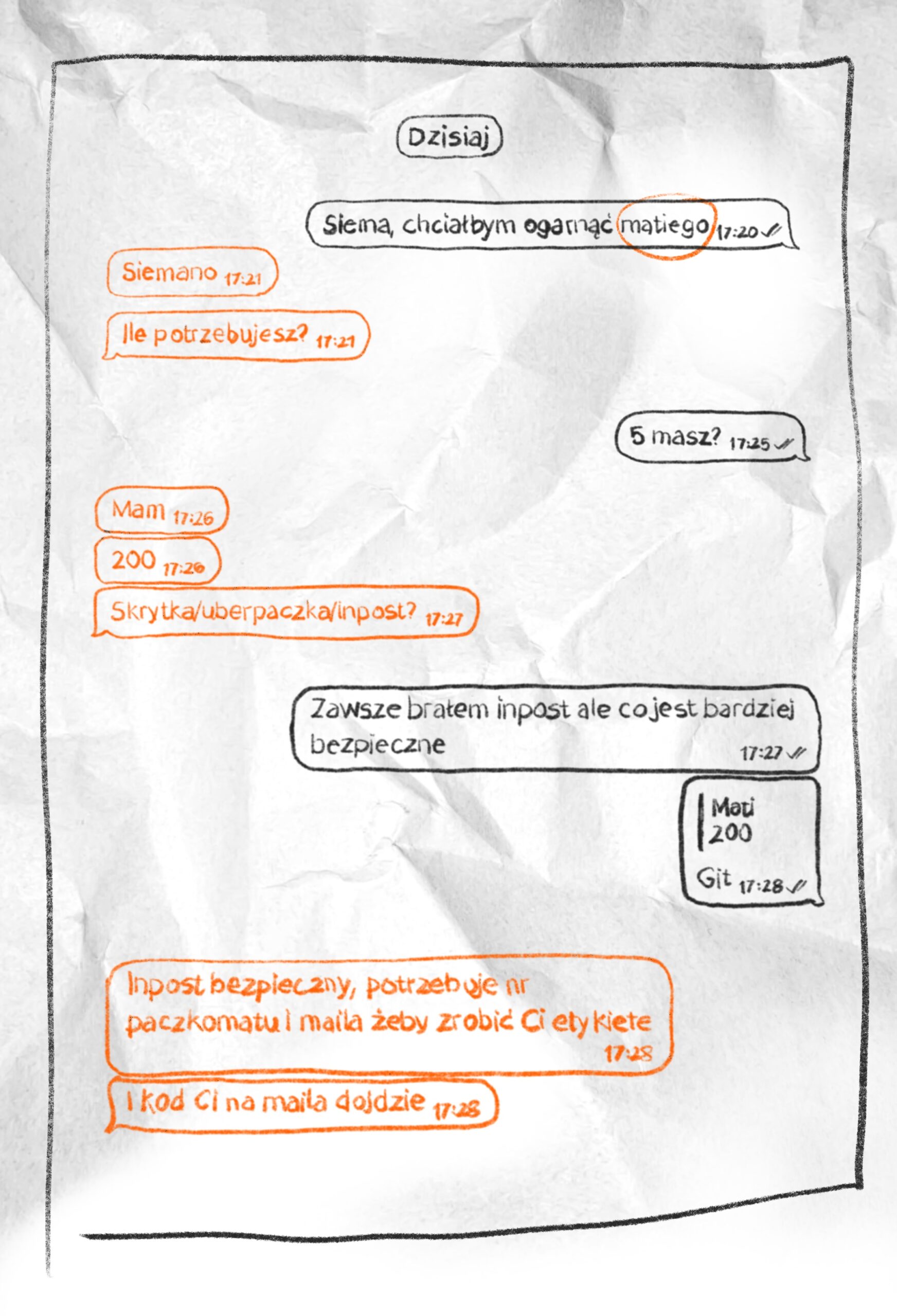
Unofficially (that is, not through the spokesperson), we have learned that InPost intercepted half a ton of drugs in 2024 alone. A separate unit has been set up within the company to fight crime (so there is a separate anti-drug budget at InPost after all). How does it check shipments? Sometimes, suspicious packages are opened after being accidentally damaged along the way.
When we asked Poczta Polska about the drug trade, it enigmatically replied that it cooperates with the National Revenue Administration (KAS) – in some facilities (e.g. sorting offices) KAS officers work with dogs. However, Poczta only has a device for scanning shipments from outside the European Union in just one place, (the sorting office in Lublin).
It is impossible to follow every parcel. What about money? What about BLIK payments? BLIK limited itself to a dry message: “We are aware that BLIK plays an important role in the digital payment ecosystem, which is why we strive to maintain the highest standards of security and compliance with the law. We strongly oppose any illegal activities. In situations where there is suspicion of illegal use of our service, we work closely with banks and law enforcement agencies, providing the necessary support to ensure that BLIK remains a tool for safe and fair transactions.”
The point is that BLIK does not process bank customers’ data — it only connects other financial platforms that serve customers. When John sends money to Jack, BLIK sees the data of the companies (e.g. banks) that serve them, but not that of John and Jack themselves.
Could BLIK track down the dealer at the ATM? No. The police can do that, but they would need to know what time and where the dealer withdrew the cash. Based on the time and ATM location of the withdrawal,, it could be possible to determine which bank issued the application from which the BLIK code was generated.
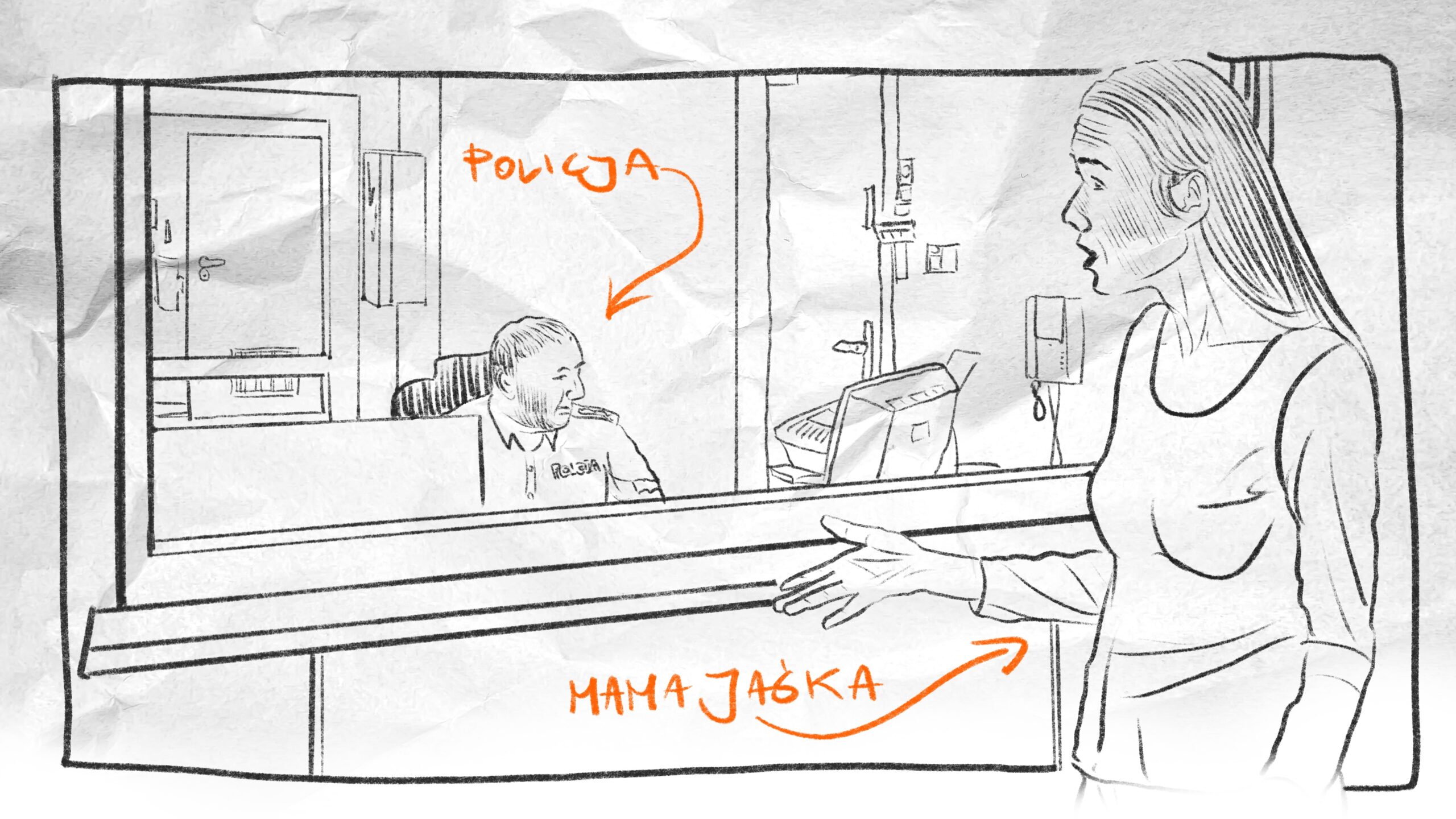
Anna, Jasiek’s mom:
He ended up in the ICU, I went to the police station. I said: guys, seriously, are you not able to get to the bottom of this? I’ll help you, I have the child’s phone here, you can join the group, pretend to be him and that’s it. I knew Lord was the dealer from whom Jasiek bought drugs. That another dealer was nicknamed Wieczorynek. They just didn’t want to. They listened, looked through Jasiek’s phone. The message was short: there wasn’t much they could do.
Police: There Is No Problem, So There Is One
The problem of drug trafficking via Telegram is a concern for law enforcement agencies in other countries. In Poland, there is no political debate on this subject, and the police and prosecutor’s office do not have experts who can keep up with the digitalization of the drug market. From time to time, the National Revenue Administration (KAS) inspects suspicious shipments — as in July 2024, when it inspected more than 63,000 postal and courier shipments in two weeks. In this one operation alone, officials found 116 illegal shipments, including more than seven kilos (over 15 pounds) of drugs.
Throughout 2024, the KAS units made 199 “disclosures in postal shipments” with a total weight of over 98 kilograms (over 216 pounds). Eighteen suspicious shipments were found in domestic shipments, and 181 in foreign shipments.
The Central Bureau of Investigation (CBŚP), which is responsible for combating drug crime, officially admits that there is no consistent data on Telegram trading. The Bureau’s pharmaceutical crime officer did not get permission from his superiors to talk to us about Telegram.
We have heard through an anonymous source that the Central Bureau of Investigation and Protection (CBŚP) mainly hunts the big fish and larger dealer networks. Telegram is a small item for the Bureau. “What possibilities we have in this regard and to what extent law enforcement agencies monitor the activities of perpetrators and customers will remain a secret — and hopefully for as long as possible,”– Piotr Woźniak from the Central Bureau of Investigation and Protection (CBŚP) replied in colourful Polish.
We visited the office of a prosecutor from a large Warsaw prosecutor’s office who has handled major drug trafficking cases. In the room, volumes of files were everywhere, lying even on the floor. The prosecutor (who prefers to remain anonymous) admitted that law enforcement agencies have a problem understanding the phenomenon of Telegram trading, with its infrastructure and specific codes: “In most cases, prosecutors stop at pressing charges against consumers,” he said. “Then the cases are often dismissed due to the low level of harm caused by the offence.”
The prosecutor calculates that the dealers he is currently investigating distribute around 100 shipments a day.
We check: in 2024, prosecutors charged almost 2,000 people with drug trafficking. 23,500 with possession. In previous years, the numbers were similar.
We asked all 17 regional police headquarters the same questions: have you encountered drug dealing via apps and instant messaging services in the last four years? Do you know about the distribution of drugs via parcel lockers?
The police headquarters in Wrocław and Szczecin are ignoring us. From the 15 responses we received from others, it appears that either no one in the police force is dealing with the issue or they are only dealing with it on a case-by-case basis.
Police officers from Gdańsk boasted that they have arrested six people (including two Czechs) involved in this type of crime in four years. From Olsztyn, they report seven crimes related to drug trafficking through parcel lockers.
Police officers from Lublin explained to us that criminals use instant messaging services – and that, unfortunately, the police do not have any statistics on this. Police officers from Rzeszów sent us a link to a text about one of their investigations (concerning trade on the Darknet). The police headquarters in Gorzów gave us only a short sentence: such crime does not exist. Full stop.
The police department in Radom were of a similar opinion. The police in Katowice do not analyze cases of this kind of crime. The police in Bydgoszcz were mysterious: recognizing dealers’ communication channels is part of operational work that cannot be discussed publicly.
We went to the Police Headquarters to meet with officers from its two departments: the department for combating drug crime and the Central Office for Combating Cybercrime (CBZC). They began by boasting about their successes in dismantling mephedrone factories. Last year alone, they closed 85 of them and seized 38 tons of illegal substances.
And online trade? The chiefs threw up their hands: the police are usually powerless against traffickers. Ten people at the National Police Headquarters deal with drug-related crime. “We are not here to conduct cases in the classical sense, but to coordinate and analyze certain phenomena. We also provide assistance to field units in the most complicated cases,” we were told.
So we don’t know how many police officers in Poland are currently dealing with drug trafficking cases? “It’s impossible to say because it’s the responsibility of different departments,” the officers explained. A few days later, however, they calculated that there were about 1,600 of them. This was made more difficult by the fact that not every provincial police headquarters has a drugs division. “We are unable to keep up with the flood of information and the possibilities offered by new media. There are not enough of us. It is physically impossible for us to deal with all the criminals who operate online. One must be aware that criminal activity on the Internet usually takes place using foreign servers,” said Wojciech Nagórniewicz, acting head of the Department for Combating Drug Crime at the Criminal Bureau of the Police Headquarters.
The police officer from the Central Bureau of Investigation and Counter-narcotics, who was present at the meeting, asked not to be named. At the end of last year, there were 500 vacancies in his department (there are almost 12,000 in the entire police force).
Is it impossible to catch drug dealers on Telegram? A year ago, the Latvian police set up a unit specializing in monitoring chat applications for drug trafficking. The special group is particularly interested in Telegram, mainly looking for dealers. “It takes work to catch each of them. They have different ways of camouflaging themselves, but we know them and we can work them out,” said Juris Staļģevics, head of the Riga regional police, at a conference in January 2024.
In response to our questions, the Latvians boasted that their capital city police arrested 47 people for drug dealing on Telegram in 2024. The year before, it was 78. The Latvians admit that cooperation with Telegram improved after Durov’s arrest.
Anna, Jasiek’s mom:
I don’t understand what happened to me at the police station. Instead of investigating the death of a teenager from a drug overdose, they could have been going after major criminal groups.
The Entry Requirement for Good Boys
31-year-old Damian B. moved from Kielce to the Netherlands, where he earned peanuts from legal jobs on the internet. He set up a dealer network in Poland through the websites passionat.cc, rcmonster.shop, rcmonster.io and bostlab.fun. As the public prosecutor’s office put it: he distributed “substances harmful to people’s life and health called dopants.” In total, the prosecutor’s office gathered evidence that he had distributed at least over 100 kilos of chemicals. To cover his tracks, he converted money into cryptocurrency.
Damian B.’s chemists quickly acquired expensive cars (the prosecutor’s office found an Aston Martin and several Mercedes among others). They kept several million in cash in their home safes and watches worth the price of a car on their wrists. They felt like young wolves – one of them, already behind bars, tried to bribe a prison officer to bring him a bottle of booze for a thousand zlotys.
The group organized a logistics centre in an apartment in a block of flats in Kielce. When one of the gang members was visited by his fiancée, she noticed, and later told authorities, that the man weighed bags of white powder. At other times, the room was filled with parcels with InPost labels, according to the case files.
The group also operated 32 legitimate bank accounts, set up for “straw men.” Damian B. personally supervised and ordered the operation of InPost parcel lockers, in whose compartments several dozen packages of drugs were deposited every day (to cover his tracks, he drove a rental car to the parcel lockers). Fictitious persons were listed as the senders.The prosecutor’s office calculated that InPost delivered parcels to at least several hundred recipients. But it was the documentation from InPost that made it possible to intercept 101 parcels sent by the group.
The gang got caught by accident. One day in June 2018, a parcel was damaged at the InPost branch in Tarnobrzeg. A strange substance spilled out from inside. Almost 300 similar parcels from the same account had been sent out previously.
The prosecutor noted: the gang could operate because InPost allows you to send a parcel without having to register in the “parcel manager” application; a phone number and email address were enough.
In total, the prosecutor’s office charged four people from Damian B.’s network (it is known that more than 20 were involved). The prosecutor’s office determined that this activity was related to the death of two people who were Damian B.‘s customers. However, he was only responsible for drug trafficking.
“In the era of Telegram and other instant messaging services, the drug market has become less brutal,” says Grzegorz Wodowski, manager of the Monar clinic in Krakow. “Sounds good, doesn’t it? But it means that today, any ‘good boy’ can go online and buy drugs. At most, he risks his own money, not being beaten and having his arms twisted by someone in a dark alley. What’s more, on the drug market today, a teenager who is proficient in the use of the internet even has an advantage over the muscle man who rules the street. It may be safer, but it is also easier to get these drugs when you buy them online, paying with cryptocurrency, rather than from a thug in the doorway.”
The Polish version of this investigation was published on FRONTSTORY.PL.
Subscribe to Goulash, our original VSquare newsletter that delivers the best investigative journalism from Central Europe straight to your inbox!







